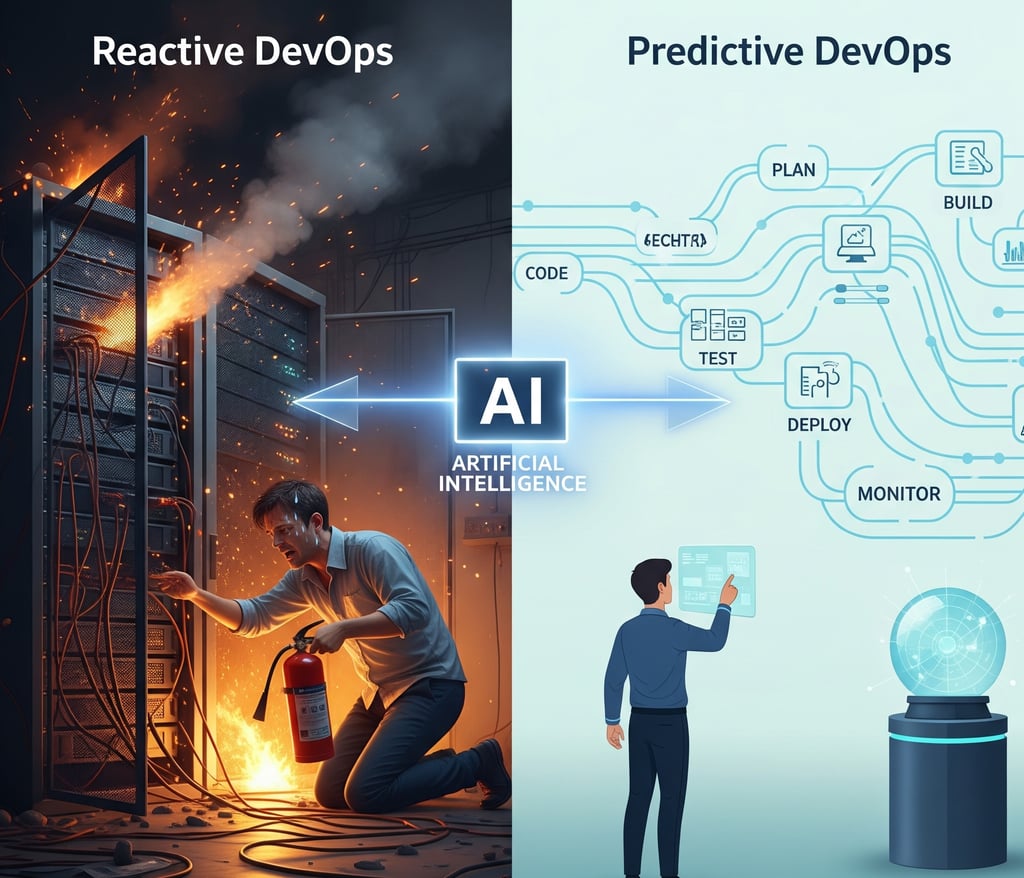From Reactive DevOps to Predictive DevOps: How AI Redefines Reliability
For decades, IT operations have lived in a reactive world. Servers crash, systems go down, users complain—and only then do teams respond. Even with the rise of DevOps and SRE, most organizations are still stuck in detect-and-react mode. But today, with the integration of artificial intelligence and machine learning, we are at the dawn of something transformative: Predictive DevOps.
Voruganti Kiran Kumar
3/6/20232 min read


For decades, IT operations have lived in a reactive world. Servers crash, systems go down, users complain—and only then do teams respond. Even with the rise of DevOps and SRE, most organizations are still stuck in detect-and-react mode. But today, with the integration of artificial intelligence and machine learning, we are at the dawn of something transformative: Predictive DevOps.
Predictive DevOps doesn’t just mean faster response times. It means anticipating failures before they happen, dynamically optimizing systems, and ensuring reliability as a default state.
Why Reactive DevOps is Hitting a Wall
Traditional DevOps excels at speed and automation, but it still has limitations:
Reactive Monitoring – Dashboards light up only when thresholds are crossed.
Firefighting Mode – Teams rush to resolve problems already impacting users.
Scaling After the Fact – Auto-scaling triggers after load spikes, not before.
Human-Centric RCA – Root cause analysis often depends on manual expertise.
The result? Downtime remains inevitable, and customer trust is always at risk.
What Predictive DevOps Looks Like
By embedding AI and ML into the DevOps lifecycle, predictive capabilities emerge:
Anomaly Detection Ahead of Failures
Models continuously analyze signals (logs, metrics, user behavior) to forecast disruptions before thresholds break.Dynamic Resource Allocation
Predictive auto-scaling adjusts before a traffic surge, not during it.Self-Learning Feedback Loops
Incident outcomes feed back into models, improving predictions over time.Proactive Security
Predictive DevOps doesn’t stop at uptime. AI models flag suspicious patterns that could indicate security breaches before they unfold.
Practical Example: Black Friday at Scale
Imagine an e-commerce company heading into Black Friday. Traditional DevOps sees load spikes only when they hit. Predictive DevOps, however, forecasts traffic growth hours in advance, pre-warms servers, optimizes caching strategies, and reroutes traffic—all automatically. The difference: seamless uptime during the biggest revenue event of the year.
Industry-Wide Implications
Finance → Forecast trading spikes, ensure transaction reliability.
Healthcare → Predict infrastructure needs for telehealth surges.
Telecom → Anticipate peak demand across geographies.
Manufacturing/IoT → Detect machine failures before they stop production.
Predictive DevOps is not a niche advantage. It’s becoming a core reliability strategy across industries.
Challenges and Misconceptions
“AI is a Black Box” → Organizations fear unexplained decisions. This is why explainable AI (XAI) must be baked in.
“It’s Too Expensive” → The reality: the cost of one outage often dwarfs the investment.
“It Replaces Engineers” → Wrong. It augments engineers, freeing them from repetitive firefighting to focus on innovation.
The Future: Self-Healing, Predictive Systems
The ultimate vision is self-healing infrastructure:
Failures predicted hours in advance.
Systems that reconfigure themselves automatically.
Engineers moving from reactive responders to strategic designers of resilience.
This is more than incremental progress. It’s a paradigm shift—one that will separate organizations that merely survive from those that thrive.
Final Thoughts
Predictive DevOps represents the future of reliability engineering. It’s not just about preventing downtime—it’s about building a world where systems anticipate, adapt, and evolve continuously.
For engineers and organizations alike, the question isn’t if predictive DevOps will become the standard. It’s when—and who will lead the way.
Call to the Community
Do you believe predictive models can ever replace human intuition in reliability engineering?
What’s the biggest barrier to adopting predictive DevOps in your organization?
Let’s open the dialogue and push the boundaries of what’s possible.